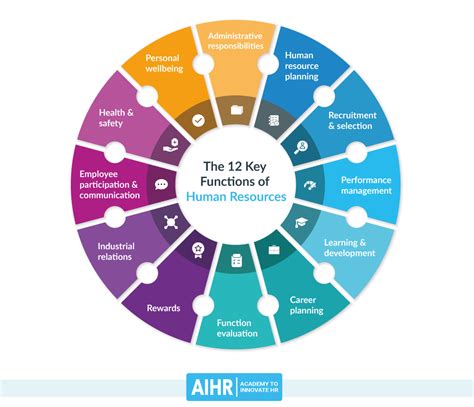The role of Human Resources (HR) in an organization has evolved significantly over the years. From being merely an administrative function to becoming a strategic partner in business, HR now plays a vital role in driving organizational success. One of the key aspects of HR is skill development, which is crucial for enhancing employee performance, productivity, and job satisfaction. In this article, we will explore the 7 essential HR functions for skill development.
Understanding the Importance of Skill Development
Before we dive into the HR functions, it's essential to understand why skill development is crucial for organizations. In today's fast-paced and competitive business environment, companies need to stay ahead of the curve to remain relevant. This requires employees to possess the necessary skills, knowledge, and competencies to perform their jobs effectively. Skill development is critical for:
- Enhancing employee performance and productivity
- Improving job satisfaction and engagement
- Building a competitive advantage
- Driving business growth and success
HR Functions for Skill Development
Here are the 7 essential HR functions for skill development:
1. Talent Management
Talent management is the process of identifying, developing, and retaining top performers within an organization. HR plays a crucial role in talent management by:
- Identifying skill gaps and developing training programs to address them
- Creating career development plans for employees
- Providing opportunities for growth and advancement
- Retaining top talent through competitive compensation and benefits

2. Performance Management
Performance management is the process of setting goals, evaluating performance, and providing feedback to employees. HR plays a critical role in performance management by:
- Developing performance management systems and processes
- Setting goals and objectives for employees
- Evaluating employee performance and providing feedback
- Identifying areas for improvement and developing training programs

3. Training and Development
Training and development is the process of enhancing employee skills and knowledge through various programs and activities. HR plays a vital role in training and development by:
- Identifying training needs and developing training programs
- Creating training content and materials
- Delivering training programs and evaluating their effectiveness
- Providing opportunities for ongoing learning and development

4. Succession Planning
Succession planning is the process of identifying and developing future leaders within an organization. HR plays a critical role in succession planning by:
- Identifying key positions and developing succession plans
- Developing leadership development programs
- Creating talent pipelines for key positions
- Providing opportunities for growth and advancement

5. Career Development
Career development is the process of helping employees advance in their careers through various programs and activities. HR plays a vital role in career development by:
- Creating career development plans for employees
- Providing opportunities for growth and advancement
- Developing mentorship programs
- Creating opportunities for lateral movement and job rotation

6. Performance Coaching
Performance coaching is the process of providing one-on-one coaching to employees to enhance their performance and address areas for improvement. HR plays a critical role in performance coaching by:
- Developing coaching plans for employees
- Providing coaching and feedback
- Identifying areas for improvement and developing training programs
- Evaluating the effectiveness of coaching programs

7. Learning Management Systems
Learning management systems (LMS) are software applications used to deliver, track, and manage training programs. HR plays a vital role in LMS by:
- Developing and implementing LMS platforms
- Creating training content and materials
- Delivering training programs and evaluating their effectiveness
- Providing opportunities for ongoing learning and development

Gallery of Essential HR Functions






FAQs
What is the role of HR in skill development?
+HR plays a vital role in skill development by identifying training needs, developing training programs, and providing opportunities for growth and advancement.
What are the essential HR functions for skill development?
+The 7 essential HR functions for skill development are talent management, performance management, training and development, succession planning, career development, performance coaching, and learning management systems.
How can HR develop effective training programs?
+HR can develop effective training programs by identifying training needs, creating training content and materials, delivering training programs, and evaluating their effectiveness.
We hope this article has provided valuable insights into the essential HR functions for skill development. By understanding these functions, organizations can develop effective strategies for enhancing employee skills and knowledge, driving business growth and success.
